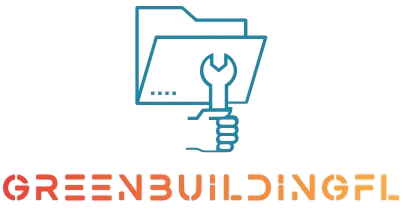Welcome to GreenBuildingFL, Your Guide to Smarter, Greener Projects
Welcome to GreenBuildingFL, your trusted source for everything related to green building and project management. Whether you are a professional project manager, a builder, or someone interested in sustainable construction, you will find valuable information here. Our goal is to help you manage green projects effectively. We use clear and simple language to make complex topics easy to understand. We invite you to explore our content and discover practical tips, tools, and guides that will help you succeed in your green building projects. Stay with us as we share insights on project management, project planning, and how to lead green building projects from start to finish.
Understanding Green Building: What It Is and Why It’s Important
Green building means designing and constructing buildings that are better for the environment and people. These buildings use less energy, save water, and reduce waste. Green buildings also create healthier indoor environments. With rising energy costs and increasing concern for the planet, green building has become essential. It not only lowers utility bills but also protects natural resources for future generations. Many cities and states now require green building standards. Therefore, understanding green building practices is important for everyone involved in construction and management.
Understanding green building involves recognizing the importance of sustainable design, energy efficiency, and responsible resource use in today’s construction practices. At GreenBuildingFL, we highlight why these principles matter for a healthier planet and better communities. And when it's time to relax, you can still enjoy responsibly—explore the excitement of jeux de casino en ligne for a fun and engaging break.
The Role of a Project Manager
A project manager plays a crucial role in the success of any building project. When managing green projects, the role becomes even more important. The project manager leads the team, keeps the project on track, and ensures goals are met within the budget and timeline. They communicate with clients, contractors, and suppliers to make sure everyone understands the green building requirements. The project manager also solves problems quickly and adapts to changes. To be successful, they must know about sustainable materials, energy-saving techniques, and environmental regulations. At GreenBuildingFL, we offer clear guidance on how to develop these skills and manage green projects effectively.
The role of a project manager involves balancing deadlines, resources, and sustainable goals often requiring high levels of focus and coordination. Taking short breaks can help maintain productivity and mental clarity. For those who enjoy a quick recharge, explore the exciting options available at https://www.casinoroo.io/. It's a refreshing way to unwind after navigating the demands of project leadership.
Essential Steps in Project Planning for Green Building
In green buildings, planning requires careful attention to detail and sustainability goals. You need to know what the client expects and which green certifications or standards must be met. Next, identify all stakeholders, including owners, architects, city officials, and contractors. Understanding their needs and roles will help you communicate better throughout the project. After that, outline the project scope. This includes all the tasks required to meet the green goals, such as installing energy-efficient systems or using recycled materials. Then, break the work into smaller tasks, assign responsibilities, and create a timeline. A detailed schedule helps keep everyone on the same page and allows for tracking progress. Also, include a budget that covers all aspects of the green project, including eco-friendly materials and technologies. Finally, plan for risks by identifying potential problems like delays or cost overruns and decide how to handle them. Quality and safety plans should also be part of your project planning to ensure compliance with green building codes.
How to Manage Green Building Projects Effectively
Project management involves turning plans into reality. During the execution phase, you oversee construction activities, coordinate workers, and ensure quality control. You should also communicate regularly with the team and stakeholders to report updates and solve issues promptly. Green building projects may face unique challenges, such as sourcing sustainable materials or meeting strict energy standards.
A good project manager anticipates these challenges and adapts the plan as needed. Control costs by tracking spending against the budget and making adjustments when necessary. Use checklists and site inspections to maintain quality. Once the project is complete, conduct a final walkthrough with the client to verify everything meets the green requirements. Finally, close the project by documenting lessons learned and storing important records for future reference. At GreenBuildingFL, we provide step-by-step guides and templates that help you manage all these phases smoothly.
Key Green Building Practices to Know
To build green, you must understand several important practices. Energy efficiency is a top priority. This includes using high-quality insulation, energy-efficient windows, and LED lighting. Smart heating and cooling systems reduce energy use and improve comfort. Renewable energy sources like solar panels can power the building with clean energy. Water conservation is another key area. Choosing eco-friendly materials is also essential. Use recycled or reclaimed wood, non-toxic paints, and low-VOC finishes to reduce environmental impact. Proper recycling and reuse of materials help reduce landfill waste. Proper ventilation and the use of non-toxic materials improve air quality. We offer detailed information and practical tips on all these green building practices so you can apply them to your projects.
Tools and Resources for Green Project Success
Having the right tools makes project management easier. On GreenBuildingFL, you will find downloadable checklists, templates, and spreadsheets designed specifically for green building projects. These include project schedules, budgeting worksheets, risk management forms, and quality control checklists. Using these resources helps you stay organized and efficient. We also share articles and case studies that offer real-world examples and lessons learned from green building projects. By using our tools and learning from others’ experiences, you can avoid common pitfalls and complete your projects successfully.
Learn and Grow with GreenBuildingFL
We believe learning is a continuous journey. That’s why we regularly update our website with new articles, videos, and tutorials. You can learn about the latest green building technologies, new regulations, and management techniques. Our content is designed to be easy to understand, no matter your experience level. We also host webinars and online events where you can ask questions and hear from experts. Joining our community will keep you informed and help you grow as a green building professional.
At GreenBuildingFL, we believe in creating opportunities to learn and grow through sustainable practices and innovative project insights. As you expand your knowledge and professional skills, it’s equally important to take time to recharge. For a bit of fun and excitement, check out the top big win casino options and enjoy some thrilling gameplay with the chance for big rewards.
Why Choose GreenBuildingFL?
You might wonder why GreenBuildingFL is the right place for your green building journey. We focus on simplicity and clarity. Our content uses short sentences and active voice to make learning easy. We cover all key areas of project management, planning, and green building. Plus, we offer practical tools and real examples to help you apply what you learn. We keep our site updated with fresh content to ensure you stay informed about the latest trends and technologies. Most importantly, we build a welcoming community where you can learn and grow. Staying here means you get the support and knowledge to succeed in your green projects.
Understanding Green Building Certifications
Green building certifications help measure how environmentally friendly a building is. Popular certifications include LEED, WELL, and BREEAM. Each program has specific criteria for energy use, water efficiency, material selection, and indoor air quality. For project managers, knowing certification requirements early helps in planning and avoids costly changes later. GreenBuildingFL offers guides on how to prepare your project for certification, what documents are needed, and how to work with certifying agencies. This knowledge gives your projects credibility and increases their value.
Understanding green building certifications is essential for staying competitive and compliant in sustainable construction. At GreenBuildingFL, members enjoy exclusive content such as certification guides and expert insights to support their professional growth. For more exciting opportunities, Discover more.
Sustainable Materials: Choosing the Right Options
Materials play a big role in green building. Choosing sustainable materials means using resources wisely and reducing waste. Some materials are renewable, like bamboo and cork, which grow back quickly. Others, like recycled steel and reclaimed wood, reuse waste and lower the demand for new resources. A project manager must know where to find these materials and how to compare costs. GreenBuildingFL provides detailed lists and sources for sustainable materials. We also explain how to balance price, availability, and environmental impact when making choices.
How to Create a Green Building Budget
Budgeting for green projects is different from traditional projects. Some green materials and technologies cost more upfront but save money over time through lower energy bills. To create a good budget, start with clear project goals and a detailed list of green features. Research prices for eco-friendly materials and equipment. Don’t forget to include training costs for workers who need to learn new techniques. Also, set aside funds for certification fees if you plan to get certified. GreenBuildingFL provides budgeting templates and tips to help you estimate costs accurately. This ensures your project stays financially healthy while achieving sustainability goals.
Managing Project Risks in Green Building
Every project has risks, but green building projects can have unique ones. For example, delays in getting special materials or unexpected changes in environmental regulations can cause problems. Managing risks means identifying potential issues before they happen and making a plan to deal with them. This could include having backup suppliers or extra time in the schedule. Regular communication with your team and stakeholders also helps catch problems early. On GreenBuildingFL, you will find risk management checklists and strategies tailored to green building.
Green Building Technologies to Watch
Technology is rapidly changing the way we build green. Smart home systems can control lighting, heating, and cooling to reduce energy use. New insulation materials offer better performance and durability. Solar panels and battery storage are becoming more affordable and efficient. Project managers must stay updated on these innovations to recommend the best options. Learning about these tools helps you lead projects that are modern, efficient, and sustainable.
Communication: The Key to Successful Project Management
Clear communication is vital in any project, especially green building projects. You need to explain green goals and requirements to every team member clearly. Misunderstandings can cause delays or mistakes that are costly to fix. Using simple, direct language and regular meetings helps keep everyone informed. Digital tools like project management software can track progress and share documents easily. GreenBuildingFL offers advice on communication best practices, including templates for emails, meeting agendas, and status reports.
Training Your Team on Green Practices
Workers and subcontractors must understand new materials, installation techniques, and safety standards related to green building. Offering training sessions or workshops before and during the project improves quality and reduces errors. Training also increases worker confidence and motivation. GreenBuildingFL shares training resources and tips on how to organize effective sessions. Investing in team education pays off with better results and happier clients.
Training your team on green practices is a vital part of sustainable project planning. At Greenbuildingfl.com, we emphasize the importance of equipping teams with the knowledge and tools needed to implement eco-friendly strategies effectively. While building a culture of sustainability, it’s also important to balance work with wellness. For a fun and exciting break, consider unwinding with casino slot machines just remember to enjoy responsibly.
Tracking and Reporting Project Progress
Keeping track of what has been done and what remains is important. Use checklists, schedules, and daily logs to monitor work. For green projects, tracking energy efficiency milestones or waste reduction goals is also critical. Digital tools can automate many of these tasks and provide real-time updates. GreenBuildingFL recommends easy-to-use software options and reporting formats. Accurate tracking and reporting make your project transparent and easier to manage.
Post-Project Evaluation and Continuous Improvement
Once your green building project is finished, it’s important to review what went well and what could be improved. Discuss lessons learned about project management, material choices, and meeting green standards. Document these insights to improve future projects. Continuous improvement is key to becoming a better project manager and delivering more successful green buildings. GreenBuildingFL provides templates and guides for conducting evaluations and creating improvement plans.
Environmental Impact and Social Responsibility
Green building is not just about saving energy or money. It’s about caring for the environment and communities. Sustainable buildings reduce pollution and conserve natural resources. As a project manager, you have the chance to make a real difference. GreenBuildingFL explores how to measure and communicate these impacts, making your projects meaningful and rewarding.
At Greenbuildingfl.com, our commitment to sustainable building practices and green living in Florida extends to encouraging mindful choices in all areas of life. As part of promoting environmental impact awareness and social responsibility, it’s essential to balance recreation with sustainability. For those exploring leisure options, they can visit online pokies australia while staying conscious of responsible entertainment habits.
Understanding the Project Manager’s Role in Today’s Construction Industry
A project manager is the person who leads the project from start to finish. They organize the team, schedule tasks, and keep everything on track. In green building, the project manager also ensures that sustainable goals are met. This means they need strong skills in both construction and environmental practices. A good project manager solves problems quickly and keeps communication flowing between clients, architects, and workers. GreenBuildingFL helps you understand what skills you need to become a successful project manager in the green building industry.
Essential Skills Every Project Manager Should Have
Project managers need many skills to succeed. These include leadership, communication, time management, and problem-solving. In green building, they also need knowledge about sustainability and environmental regulations. Being organized is critical, as managing many tasks at once can get complicated. GreenBuildingFL provides tips on how to build these skills through training and experience. Developing these skills helps you lead projects that finish on time and meet green standards.
Step-by-Step Project Planning for Success
Project planning is the foundation of good project management. Next, you create a detailed schedule that lists all tasks and deadlines. In green projects, planning includes selecting sustainable materials and ensuring energy-efficient designs. Risk management and contingency plans are also part of the planning phase. GreenBuildingFL offers step-by-step guides and templates to help you plan every detail. Careful planning saves time, money, and stress later on.
Step-by-step project planning is the key to achieving success, ensuring every phase aligns with your goals and sustainability standards. At GreenBuildingFL, we emphasize structured approaches to keep projects on track. After a productive planning session, take a moment to unwind with some light entertainment at acepokies.com, where you’ll find a wide selection of games and secure, user-friendly gameplay to help you relax and recharge.
Setting Realistic Project Goals
Clear and realistic goals are essential. Goals give the project direction and purpose. For green building, goals might include reducing energy use by a certain percentage or achieving a certification. GreenBuildingFL explains how to set and track these goals throughout your project.
Effective Scheduling Techniques for Project Managers
Scheduling is more than just making a calendar. It means planning the order of tasks and estimating how long each will take. Good scheduling avoids delays and helps balance work among team members. For green buildings, scheduling must account for special inspections and delivery of eco-friendly materials. GreenBuildingFL teaches you how to use these tools to keep your project running smoothly.
Effective scheduling techniques are key to successful project management, especially when aligning timelines with environmental goals. At Greenbuildingfl.com, we explore strategies that promote both efficiency and sustainability. Interestingly, even sectors like mobile online casino sites are adopting eco-conscious scheduling and operations—reducing energy use in data centers and prioritizing responsible gaming. These practices demonstrate how smart planning can lead to both project success and a reduced environmental footprint.
Managing Project Budgets: Tips and Tricks
Staying within budget is one of the biggest challenges for project managers. Creating a detailed budget helps you plan costs for materials, labor, equipment, and unexpected expenses. In green building, some eco-friendly products cost more upfront, so budgeting must consider long-term savings. Project managers should track expenses regularly and adjust the budget as needed. GreenBuildingFL provides budget templates and advice on cutting costs without lowering quality.
How to Lead a Successful Project Team
A project manager leads people with different skills and roles. Good leadership means clearly communicating goals, supporting your team, and resolving conflicts quickly. Motivated teams work better and finish projects faster. In green projects, everyone needs to understand the importance of sustainability.
Leading a successful project team requires focus, strategic thinking, and the ability to stay composed under pressure. Just like in leadership, where every decision counts, games like blackjack can sharpen your decision-making skills. Take a break and experience the thrill of smart play at Crazy Vegas Online Blackjack and play to win big!
Risk Management: Preparing for the Unexpected
No project goes exactly as planned. Risks can include weather delays, supply shortages, or technical issues. Project managers identify possible risks early and prepare plans to reduce their impact. This can include having backup suppliers or extra time built into the schedule. GreenBuildingFL offers risk assessment checklists and strategies to handle common project risks. Being ready for surprises keeps your project on track and protects your investment.
Communication Strategies for Project Success
Project managers must keep everyone informed — clients, team members, suppliers, and stakeholders. Regular meetings and clear reports help prevent misunderstandings. Using technology like messaging apps and project software improves communication speed. GreenBuildingFL gives examples of communication plans and tools to help you stay connected with your team.
Using Technology to Improve Project Management
Technology is changing how projects are managed. Project management software can help plan schedules, track budgets, and assign tasks. Many programs also offer real-time updates and document sharing. For green building projects, technology can track energy use or monitor waste reduction goals. GreenBuildingFL reviews useful project management tools and teaches you how to use them effectively. Embracing technology makes managing complex projects easier and more efficient.
Continuous Learning for Project Managers
Project management is a field that is always evolving. New methods, tools, and regulations appear regularly. Successful project managers keep learning through courses, certifications, and reading industry news. This continuous growth helps you stay competitive and improve your skills. GreenBuildingFL offers resources and recommendations for training and professional development. Staying curious and informed makes you a better leader and project planner.
Continuous learning is essential for project managers striving to stay updated with the latest trends in sustainability and innovation. At Green Building FL, we support your growth through valuable resources and insights. For a refreshing mental break during your learning journey, you can also explore further into the world of new Australian online casinos—offering engaging experiences in a secure environment.
Measuring Project Success and Outcomes
After completing a project, it’s important to evaluate how well it went. Project managers look at whether goals were met, budgets were followed, and deadlines were kept. For green projects, success also includes environmental impact and energy savings. GreenBuildingFL explains how to create project reports and use feedback for future improvements. Measuring success helps you build a strong reputation and deliver better projects over time.
The Future of Project Management
The green building industry is growing fast. Project managers will need to adapt to new technologies, materials, and regulations. Sustainability will remain a top priority. GreenBuildingFL stays up-to-date with industry trends and innovations to help you prepare for the future. Learning about new tools and practices today will make you ready to lead the next generation of eco-friendly projects.
Join the GreenBuildingFL Community
Building green is a team effort. On GreenBuildingFL, you can connect with other project managers, builders, and green enthusiasts. Our community forums allow you to ask questions, share your knowledge, and discuss challenges. We also offer a newsletter that delivers the latest news and tips straight to your inbox. Engaging with others will give you new ideas and support as you work on your projects. Together, we can promote green building practices and make a positive impact on the environment.










